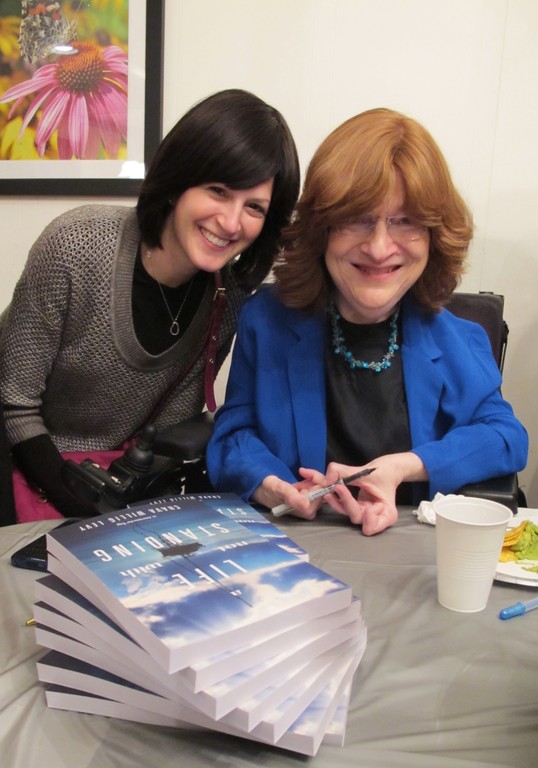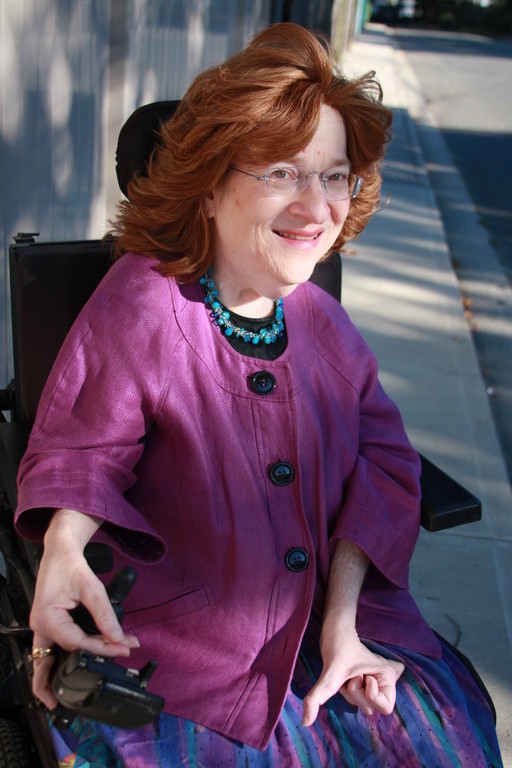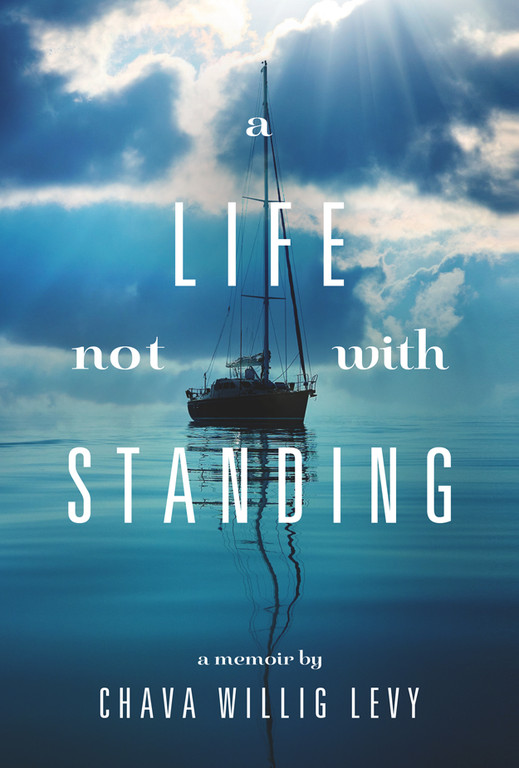Not limited by disability, Levy’s story shatters stereotypes
After Chava Willig Levy exits the main sanctuary of Aish Kodesh in Woodmere, with congregants wishing her a “good Shabbos,” she is on her way, often accompanied home by one or two young women who push her wheelchair and stay to visit and assist.
That Chava, a survivor of childhood polio who is a lecturer, writer and editor, is defined by more than her disability, is made clear in her just-published memoir, “A Life Not With Standing.” Married to Rabbi Michael Levy, director of travel training for NYC Transit who is blind since birth, the couple has shattered myths about people with disabilities.
They are vibrant, active members of the community: Chava hosts women singers in her home once a month (the Kol Isha Society) and participated in Harmony, the community’s biennial concert for women. She speaks in schools and presents shiurim for adults. Michael occasionally speaks from the pulpit with a wry, intellectual delivery. Both love words, music and Judaism, and are “addicted” to Scrabble. Married 30 years, they have two children, a married daughter who teaches nursery in Far Rockaway and a son studying psychology at Touro, and one grandchild.
Chava was born in 1952 in Brooklyn, the third of four children. In the summer of 1955, her parents opted to leave the city, where polio was rampant, in the hope of escaping the disease.
“I can’t help but see the hashgacha (hand of G-d),” said Chava. “Not one other person in the bungalow colony contracted polio.”
She was in two hospitals, initially in an iron lung. Hospital- and then home-schooled, she ultimately attended a disability-segregated public school’s “health conservation class,” the name underscoring “the misconception that disability and illness are identical.”
“We never mingled with able-bodied students,” she said. “We were not allowed to eat in the cafeteria.”
“I was sick when I first contracted polio. Once the virus left, I had a disability,” she said. “Strangers see me at weddings and say ‘refuah shleimah’ (may you have a complete recovery). Deep down, I don’t think of myself as sick. I have a disability, not an illness.”
Chava attended Francis Lewis High School in Queens, that was wheelchair accessible and huge, with 1,000 children in each grade level, and Talmud Torah three days a week in the Young Israel of Kew Gardens Hills.
“It was thrilling to attend classes with everyone else,” she said. “Very few schools were willing to take kids with disabilities.” Many Jewish schools then were not wheelchair accessible.
She enrolled at Stern College but lived at home since she needed help with dressing and bathing. “I was finally in a yeshiva setting, and that was wonderful,” she said.
She graduated from Stern in 1973 and went on to earn an MA from Columbia University in rehabilitation counseling. She entered a PhD program in counseling psychology at New York University, but left to begin work as a career counselor.
“My boss sent me to audit a career exploration workshop so I could offer a similar workshop on my job,” she recalled. “The presenter said, ‘Why don’t you learn by doing? Participate in the exercises.’ It changed my life. The presenter said, ‘Make up a brag list, ten things you did exceedingly well and that gave you great satisfaction.” Chava’s top three items entailed telling her nieces and nephews stories, giving a speech at a Torah leadership seminar that drew a standing ovation, and teaching a song with harmony to six students there, who performed it and got a standing ovation.
“It hit me like a ton of bricks: No wonder I was unhappy as a career counselor. I revel in the spotlight — I am a kosher ham.”
Her articles have been published in Family Circle, Woman’s Day, Parents Magazine, Jewish Action and others; her essays have appeared in several books. She speaks for groups and at schools, including SKA, HAFTR, Shulamith, HALB, Bais Yaakov of Queens, Yeshiva Ketana, and Ramaz, on topics ranging from matchmaking, Providence, chesed and shattering stereotypes regarding disabilities.
Chava has been working on her memoir on and off for about 15 years. She said it was a “jagged road” with years of “writer’s terror,” and she is grateful to G-d for getting her “to the finish line.”
“I hope the book will make a difference — there are still so many misconceptions, especially when it comes to marriage,” she said. “Overwhelmingly, men and women are not willing to date someone with a disability.”
Her book details her struggles and thoughts and the incredible events leading to meeting Michael.
“Things happened then that, when they happened, felt as if G-d was out to lunch,” she said. “I noticed Michael ten years before I met him; when Hashem wants something to happen, it’s at the right time. We feel so blessed that we found each other and see Hashem’s hand in the way it came about.”
Neither of them intended to marry a disabled partner and both resented it when only those with disabilities were suggested as potential mates.
Chava and Michael love living in Woodmere but Chava points out that Manhattan, where they lived as newlyweds, is much more accessible than Woodmere.
When she speaks in high schools, she pointedly adds, “One day when you are older, perhaps someone will suggest a shidduch (match) and perhaps they’ll say, ‘This person is very artistic, has a great sense of humor and happens to get around in a wheelchair,’ and maybe you’ll see that person three dimensionally and agree to meet him or her.”

 64.0°,
Mostly Cloudy
64.0°,
Mostly Cloudy 









